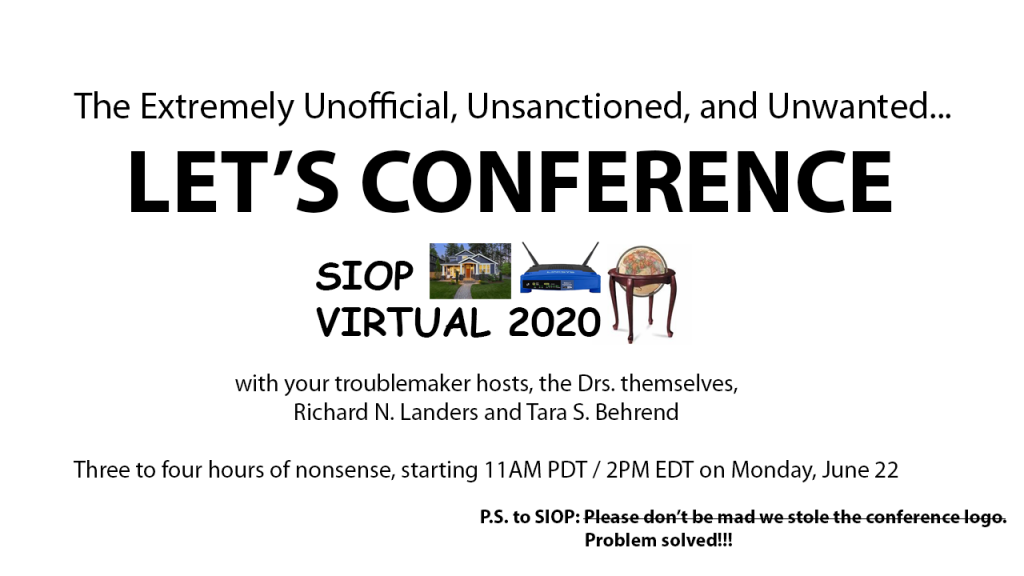Grad School Series: Applying to Graduate School in Industrial/Organizational Psychology
Starting Sophomore Year: Should I get a Ph.D. or Master’s? | How to Get Research Experience
Starting Junior Year: Preparing for the GRE | Getting Recommendations
Starting Senior Year: Where to Apply | Traditional vs. Online Degrees | Personal Statements
Alternative Path: Managing a Career Change to I/O | Pursuing a PhD Post-Master’s
Interviews/Visits: Preparing for Interviews | Going to Interviews
In Graduate School: What to Expect First Year
Rankings/Listings: PhD Rankings | Online Programs | Trustworthy Master’s and Ph.D. Rankings
Having written my grad school series, one of the most common questions I get is, “Which graduate programs should I apply to?” What people generally want to know is some variation of this question:
- What are the best IO psychology graduate programs?
- What is the best IO psychology master’s program?
- What is the best IO psychology PhD program?
- Which IO psychology programs will get me a good job?
As I’ve explained on this blog before, evaluating program quality a complicated problem. It is difficult even for those of us in the field to agree on what “best” means; it is a worse problem for you as a prospective student. Fortunately, the advice is more straightforward: in the end, you should evaluate which schools offer what you want out of them as a student. Don’t look for “the best”; look for the best for you. That means compiling information from multiple sources, including multiple rankings, and keeping track of how each program matches you, as an individual.
Because trustworthy rankings tend to get buried on various websites over time, whereas spam rankings seem to live forever, I decided to start a running list of all current trustworthy rankings of IO programs, splitting them by the year they were released. This way, you can get the most recent information available but also see historic rankings and how they’ve changed. Again, you should not rely upon any single ranking system to determine where you apply, but consulting multiple ranking systems, seeing how they agree and don’t, and then weighing that against your own priorities is a great way to narrow down the field of options. “What is the best IO psychology master’s program” or “what is the best IO psychology PhD program” has a different answer for every prospective student.
By the way, I’m defining “trustworthy” as based upon empirical data, reporting a transparent ranking methodology, and where a reasonable argument could be made for construct validity of “program quality.”
Without further ado, here is the list.
- Ph.D. Rankings
- 1997
- Princeton Review (no clue about the methodology on this one, so “trustworthy” may be a bit of a stretch, but it is a classic)
- 2004
- 2013
- 2014
- 2017
- 2018
- 1997
- Master’s Rankings
- 2004
- 2018
- Acikgoz et al.’s Student and Alumni Perceptions Rankings
- Roman et al.’s Student Perception Rankings
- Vodanovich et al.’s “Objective Data” Rankings, mostly based upon applied experiences and student accomplishments
As I alluded to earlier, there are many rankings on the internet that are… let’s say “stupid” which I have chosen not to include here (I’m looking at you thinly veiled attempts to earn commissions by sending people to online programs at Capella, Walden, and/or Phoenix). Most of these are based on nonsensical metrics (e.g., one Ph.D. ranking I found was based on tuition cost, which is misleading in several different harmful ways).
If you know of other rankings you think I should include or would like my opinion on a ranking you found, drop it in the comments!
The annual meeting of the American Psychological Association has moved fully online this year, and it’s actually pretty good – the online platform is easy to search and use, making finding interesting content very straightforward. They have a live program running for 3 days that you can tune into, plus virtual content that will be available for about a month. All pretty cheap, as low as $15 for student APA members to attend.
The virtual content includes a full program put together by SIOP: 1 invited address, 5 symposia, 1 discussion (panel), and 34 posters. Much of this content is in video, which personally I believe is necessary for a decent conference experience! So given that, I wanted to promote this portion of the SIOP program. Also, I gave the invited address! So it’s definitely a little selfish too. Here’s all the content you can experience on video from Division 14 (but check out the other divisions too!):
Invited Address
- How Can Artificial Intelligence Be Used to Better Ask and Answer Research Questions? by Richard Landers
Symposia
- Careers in Undergraduate I/O Psychology by Brian Loher, Kristian Veit & Abby Mello
- Toxic Workplaces and Abusive Leaders by Sobia Nasir, Ozge Can, Adam Chittenden, Benjamin Thomas, Parent-Lamarche Annick, Fernet Claude & Stephanie Austin
- Are Generational Categories Meaningful Distinctions for Workforce Management? by Nancy Tippens, Eric Anderman, Dana Born, Brian Hoffman, Arne Kalleberg & Julia Schuck
- Engagement in the Workplace by Zorana Ivcevic, Julia Moeller, Zehabit Levitats, Eran Vigaoda-Gadot, Dana Vashdi, Vignesh Murugavel, Roni Reiter-Palmon, Joesph Allen, Isaac Lundquist, William Kramer & Crista Taylor
- Legal Updates for I/O Psychologists: Analyzing Recent Supreme Court Cases and Workplace Implications by Eli Noblitt & Kathy Rogers
Discussion/Panel
- What’s Happening at APA and SIOP? Q&A with Division 14/SIOP Council Representatives by Tammy Allen, Jeff McHenry, Patrick O’Shea & Sara Weiner
Posters
- Generation Z at Work: Difference Makers Demanding Rewarding Experiences, Challenge, and Leader Mentoring by Yvette Prior
- Closing the Gap Between Theory and Practice: Offering I/O Master-Level Internships Online by Maria Antonia Rodriguez
- Exploring Corporate Communicative Competence and Upgrading Communicative Skills in the Bilingual, Multicultural, and Digital Kazakhstan by Sholpan Kairgali
- African-American Women Government Contractors’ Experiences of Work Engagement by Rajanique Modeste
- Examining the Process of Men Successfully Mentoring Women in Nontraditional Occupations by Amy Foltz
- Do Social Class Background and Work Ethic Beliefs Influence the Use of Flexible Work Arrangements? by Anna Kallschmidt
- Work-Family Conflict and Professional Conferences: Do We Walk the Talk? by Vipanchi Mishra
- The Practice of Mindfulness, Coping Mechanisms on Mental Fatigue by Lisa Thomas
- In the Heat of the Moment: Using Personality as a Predictor of Firefighter Decision-Making by Chance Burchick
- Factors That Influence the Tenure of Direct Support Professionals in the Intellectual and Developmental Disabilities Field by Hirah Mir

UPDATE: If you missed the live event, you can still check out a recording here! This will probably only stay posted for a few weeks, so get it while you can!
If you’re in the gaming space, or if you have a kid whom you’ve watched over their shoulder while they played Minecraft, you’ve probably seen a Let’s Play.
Let’s Plays are live, narrated explorations of video games. A person plays the game but also provides a bit of think-aloud as they play, and people watch in real-time. “That was weird!” “That was cool!” “Here’s what I’m planning to do next.” It is a sort of a combination of think-aloud and voyeurism?
If you’ve ever heard of the media streaming service Twitch, it’s devoted to Let’s Play livestreams. The audience also can post text contributions to the livestream, which the streamers see and respond to (or don’t).
With that background, I am proud to announce that alongside Tara Behrend, we will be hosting Let’s Conference: Virtual SIOP 2020. In the event, we’ll be live-watching SIOP video sessions on Monday, June 22 from around 2PM EDT / 11AM PDT through 6PM EDT / 3PM PDT and providing commentary. Maybe. We might end early if we get tired of doing it for whatever reason, no promises.

Let me first be perfectly clear. Although Tara and I are both highly involved in the SIOP organization, this is not an official, recognized, or even clearly allowed thing we’re doing. We’ve gone rogue! ROGUE I SAY!
So what’s the schedule? That’s still being finalized, but here’s the general docket:
- The interesting parts of the plenaries.
- Random friends and other colleagues whom we are pretty sure wouldn’t mind us ripping into them but we aren’t going to ask them ahead of time just to be safe.
- GRAD STUDENT FRESH MEAT. Ok, just kidding. We will probably watch some grad students at some point by watching symposia that sound interesting, but rest assured it will be constructive and thoughtful, unlike commentary on friends whom we will be destroying just because we enjoy that sort of thing, you know who you are.
- Anyone who wants to be! If you’d like your video to be included, please comment below and we’ll try to get your session on the roster!
- Suggestions of live audience members! Because Let’s Conference will be a live experience, we will be watching audience comments and taking your advice when we feel like it.
In between sessions, we’ll be chatting about what we learned, what we didn’t, and discussing audience comments/questions.
You might ask why we’re doing this… to you I say, why not!?!
When the show goes live, you’ll find it here on YouTube Live. Here’s a tentative schedule, although there’s basically zero chance we will actually get to all of these sessions:
- Opening Plenary
- Scott Tonidandal – Conference Welcome
- Georgia Chao – Introduction to Eden King
- Eden King – Outgoing President’s Message
- SIOP Foundation Visionary Circle Presentation
- Naval Gazing Hour
- 0005: Pay Equity Analysis: Hey, Labor Economist—Anything You Can Do I-O Can Do Better! (Master Tutorial)
- 0912: SIOP Select: Revising the APA Ethics Code to Better Fit the Roles of I-O Psychologists (Special Event)
- 0446: Know Your Worth: Results From the 2019 SIOP Salary Survey (Alternative Session Type)
- Poster Break 1
- Just a Look Around
- Social Justice and Current Events Hour
- 0002c: COVID-19 – Selection & Testing
- 0137: Applying I-O to Healthcare: Opportunities for Research and Practice (Ignite)
- 0329: Where Are the Men? Bringing Men Into the Mix to Push for Workplace Gender Equality (Symposium)
- 0015: WHAT Is Inclusion? Its Past, Present, and Future (Special Event)
- Poster Break 2
- Deep Dive into Technology/Gamification/Social Media/Simulations
- Methods Hour
- 0815: Using MetaBUS to Locate, Synthesize, and Visualize I-O Research Findings (Master Tutorial)
- 0016: Life in the Fast Lane: Advances in Rapid Response Measurement (Symposium)
- 0207: Excel Can Do That Too? Five Fantastic Functions for I-Os (Ignite)
- 0868: Trust in AI (Panel Discussion)
- Poster Break 3
- Deep Dive into Testing/Assessment/Selection Methods/Validation
- Closing Plenary
Go ahead and click over now to set a reminder for yourself to watch the live show. To participate, you’ll need a computer or mobile device capable of watching YouTube. See you there!